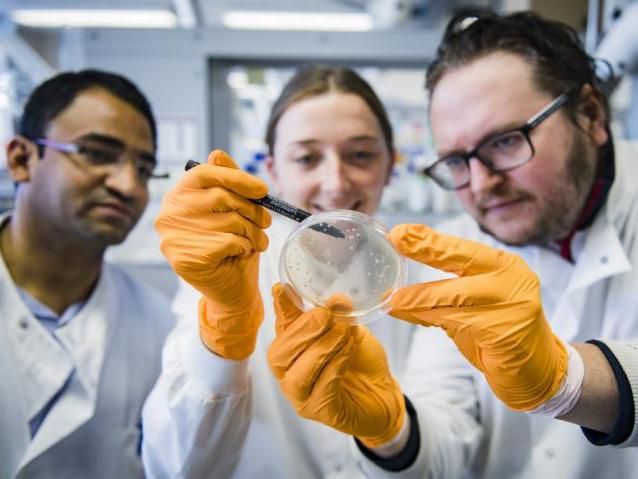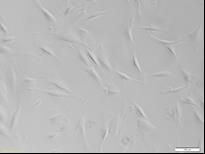BRAIN takes over anti-bitter patents and utility patent portfolio from BASF
The biotechnology company BRAIN AG has taken over a patent portfolio from its long-standing in-dustrial partner BASF SE, which was developed as part of a three year research and development partnership between the two companies. The portfolio comprises four patent families, including utility and process patents, as well as the accompany-ing utility patent for substances reducing the bitter taste of foods. Shortly after the takeover of PCT patent applications by BRAIN, the EPO applications were granted. More than 40 further applications in the four PCT patent families are currently in the grant stage in countries including the USA, China, Brazil, Japan and Russia, among others.

Human taste cells ScreenLine® HTC 09. These patented bitter-cell lines were isolated by BRAIN and are used for screening experiments.
© Archiv BRAIN AG
Many products in the food, beverage, luxury food, sweetener, animal food, pharmaceutical and cosmetics markets stand out as having a bitter aftertaste, which can be the result of specific ingredients in the various products.
In the current research and development partnership between BRAIN AG and BASF SE, biologically active and taste-based solu-tions were identified using a reputable screening programme and various compound libraries, based on BRAIN's highly complex cellu-lar assay system.
Molecular background understood
The azo dyes and fatty acid esters identified in the vast screening programme act as bitter taste modulators by attaching themselves to bitter receptors which are exposed on the surface of the taste cells and are responsible for the transfer of the undesired aftertaste. The comprehensive characterisation of these substances, along with the development and application for a utility patent, was the basis for product optimisation and innovation and an industrial use in various target industries was created.
BRAIN’s patent platform strengthened
“With the acquisition of the anti-bitter patent and utility patent portfo-lio for the innovative bitter modulators, we are expanding our patent platform of biologically active product components for efficient food optimisation. This includes an approved additive group of azo dyes, such as E110 and E129, as well as fatty acid esters in various com-mercially available and inventive formulations," says Dr. Holger Zinke, CEO of BRAIN AG. “In numerous discussions with partners we have recognised that there is increasing demand for bioactive compounds that will improve and enhance taste and health aspects of food.”
Validation of active substances on human taste cells
"Through our ScreenLine technology programme and access to our CompActives biological compound library, we can also identify dif-ferent taste areas and the substances that can be used accordingly in the nutrition field," adds Dr. Michael Krohn, Member of Executive Committee and Unit Head BioActives and Performance Biologics at BRAIN. “In the meantime, the two azo dyes were validated using our patented human bitter taste cells. Currently we are broadly marketing the molecules and the respective ScreenLine-technologies.”
Most read news
Other news from the department business & finance

Get the life science industry in your inbox
By submitting this form you agree that LUMITOS AG will send you the newsletter(s) selected above by email. Your data will not be passed on to third parties. Your data will be stored and processed in accordance with our data protection regulations. LUMITOS may contact you by email for the purpose of advertising or market and opinion surveys. You can revoke your consent at any time without giving reasons to LUMITOS AG, Ernst-Augustin-Str. 2, 12489 Berlin, Germany or by e-mail at revoke@lumitos.com with effect for the future. In addition, each email contains a link to unsubscribe from the corresponding newsletter.
Most read news
More news from our other portals
Last viewed contents

Electric fungi: The biobattery that needs to be fed - Microbiology meets electrical engineering
Association between certain pain relievers and heart attack
Scripps Research scientists find two compounds that lay the foundation for a new class of AIDS drug - Novel therapies could improve potency of existing AIDS treatments, help to combat drug-resistant virus strains

Opening the way for global innovation in biotechnology - New agreement supports sharing, innovation and openness
BASF completes acquisition of Becker Underwood - New global business unit Functional Crop Care established
Ethnopsychopharmacology
MBL scientists find genes linked to human neurological disorders in sea lamprey genome - Discovery will accelerate research on Alzheimer's disease, Parkinson's disease and spinal cord injury

AATec Medical reports significant progress in company’s first year towards unlocking the therapeutic potential of AAT - Major advancements in the development of ATL-105 for the treatment of inflammatory lung diseases
Intersection between nervous and musculoskeletal system could be key to treating Pompe disease
Evolva reaches milestone in BASF collaboration

Microchip detects vaccination gaps - A new microchip tests for antibodies against corona, measles, diphtheria and tetanus in parallel - with a single drop of blood





















































